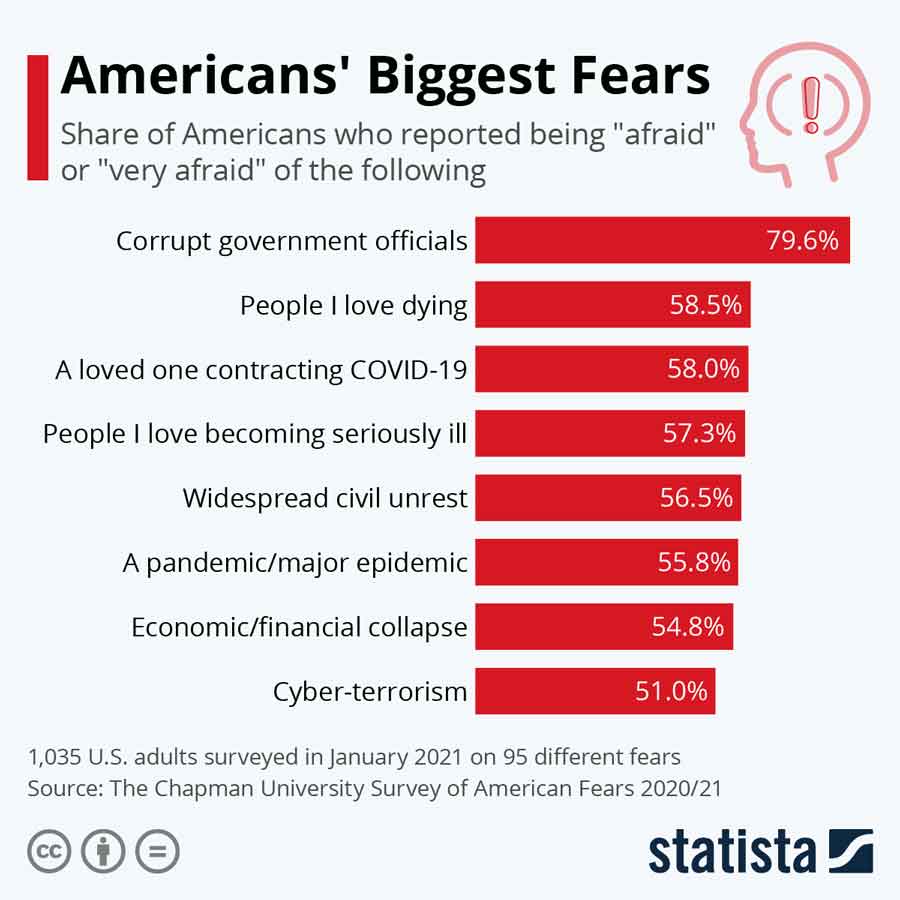Americans' Biggest Fear Is "Corrupt Government Officials"
Tyler Durden
 Halloween is considered the spooky season, and while skeletons and haunted houses can be scary, Statista's Katharina Buchholz points out that it's different things that keep Americans up at night. A survey by Chapman University in Orange county, California, shows that while some of the fears most commonly cited by Americans changed in the coronavirus pandemic, other stayed the same. Halloween is considered the spooky season, and while skeletons and haunted houses can be scary, Statista's Katharina Buchholz points out that it's different things that keep Americans up at night. A survey by Chapman University in Orange county, California, shows that while some of the fears most commonly cited by Americans changed in the coronavirus pandemic, other stayed the same.
The Survey of American Fears polled 1,035 U.S. adults on their levels of fear across 95 different options. For the fifth year in a row, "corruption of government officials" led the ranking with 79.6 percent of respondents saying the prospect made them "afraid" or "very afraid".

You will find more infographics at Statista
The fear of "people I love dying" understandably rose from rank 5 in 2019 to rank 2 in 2020/21, with 58.5 percent of people citing it. The fear of "people I love becoming seriously ill" moved down one spot into rank 4, making room for the newly-added option of "a loved one contracting COVID-19". While fear of illness and death increased, but wasn't new to the top 10, the fear of pandemics and epidemics shot up from rank 31 in 2019 to rank 6 in the most recent survey.
Probably in the context of widespread Black Life Matters protests that turned violent in some U.S. cities, the fear of "widespread civil unrest" increased even more, moving from rank 87 in 2019 to rank 5 in 2020/21. Interestingly, the increased fears of COVID, economic collapse and civil unrest pushed down fears of climate change from rank 9 to rank 13, now only being cited by 48.7 percent of Americans. Fear of pollution, ranked higher than that of climate change, equally moved down the list.
Fears in the spirit of Halloween were less common. Fear of zombies and ghosts only applied to 9.3 percent of Americans, while 5.6 percent said they were afraid of clowns. The biggest fear that could be triggered in a Halloween celebration is probably that of spiders, shared by 22.8 percent of Americans.
 our mission: our mission:
to widen the scope of financial, economic and political information available to the professional investing public.
to skeptically examine and, where necessary, attack the flaccid institution that financial journalism has become.
to liberate oppressed knowledge.
to provide analysis uninhibited by political constraint.
to facilitate information's unending quest for freedom.
our method: pseudonymous speech...
Anonymity is a shield from the tyranny of the majority. it thus exemplifies the purpose behind the bill of rights, and of the first amendment in particular: to protect unpopular individuals from retaliation-- and their ideas from suppression-- at the hand of an intolerant society.
...responsibly used.
The right to remain anonymous may be abused when it shields fraudulent conduct. but political speech by its nature will sometimes have unpalatable consequences, and, in general, our society accords greater weight to the value of free speech than to the dangers of its misuse.
Though often maligned (typically by those frustrated by an inability to engage in ad hominem attacks) anonymous speech has a long and storied history in the united states. used by the likes of mark twain (aka samuel langhorne clemens) to criticize common ignorance, and perhaps most famously by alexander hamilton, james madison and john jay (aka publius) to write the federalist papers, we think ourselves in good company in using one or another nom de plume. particularly in light of an emerging trend against vocalizing public dissent in the united states, we believe in the critical importance of anonymity and its role in dissident speech. like the economist magazine, we also believe that keeping authorship anonymous moves the focus of discussion to the content of speech and away from the speaker- as it should be. we believe not only that you should be comfortable with anonymous speech in such an environment, but that you should be suspicious of any speech that isn't.
www.zerohedge.com
| 



